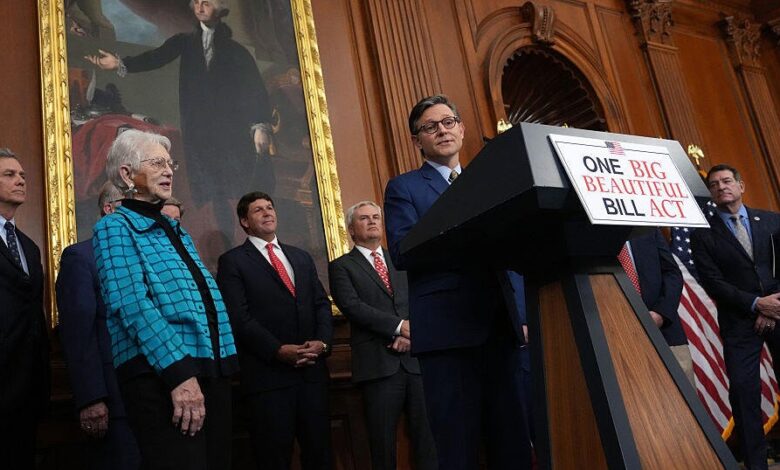Republicans aim to punish states that insure unauthorized immigrants

President Trump’s signature budget legislation is causing controversy as it targets 14 states that provide health coverage to individuals in the U.S. without authorization. These states, mostly led by Democrats, offer insurance to low-income immigrants, including children, regardless of their legal status. Advocates argue that this policy is both compassionate and cost-effective.
The federal legislation, named the “One Big Beautiful Bill” by Republicans, would significantly reduce federal Medicaid reimbursements to these states unless they roll back benefits for unauthorized individuals. The bill recently passed the House and is now headed to the Senate. Along with implementing many of Trump’s domestic priorities, such as tax cuts favoring the wealthy, the legislation also includes substantial cuts to Medicaid, potentially leaving millions of low-income people without health insurance.
If approved by the Senate, the cuts would present a challenging political and economic dilemma for the affected states and Washington, D.C., which use their own funds to provide health insurance to unauthorized individuals. These states would face a 10-percentage-point reduction in federal reimbursement for individuals covered under the Medicaid expansion of the Affordable Care Act, resulting in billions of dollars in total cuts.
California, the state with the most to lose, could see up to $3 billion in annual losses due to these cuts. The affected states collectively cover around 1.9 million unauthorized immigrants, according to analysis from the Kaiser Family Foundation (KFF). Two states, Utah and Illinois, have laws that would trigger the termination of their Medicaid expansions if federal funding is reduced, potentially leaving more low-income Americans uninsured.
California Governor Gavin Newsom condemned Trump’s bill, stating that it would devastate healthcare in the state, leading to coverage losses, hospital closures, and safety net failures. Newsom’s budget proposal in May suggested cutting benefits for unauthorized immigrants due to escalating costs in the Medicaid program. He also hinted at a possible legal challenge to Congress’s authority to penalize states for their spending decisions.
In Utah, Representative Jim Dunnigan emphasized the importance of maintaining Medicaid expansion, which covers about 75,000 adults. The state faces a tough decision if the penalty provision becomes law, as eliminating the trigger law and finding alternative funding sources would be challenging. Similarly, Illinois could see 770,000 adults lose health coverage under their Medicaid expansion if the penalty is enforced, prompting discussions on potential solutions to avoid such a scenario.
The House bill not only penalizes states covering unauthorized individuals but also includes measures to cut federal Medicaid spending. States would be required to verify the employment status of adults covered by Medicaid, recertify eligibility more frequently, and halt the practice of taxing healthcare providers to fund Medicaid costs. The Congressional Budget Office estimates that millions more people could be uninsured by 2034 if the bill is enacted, with the expiration of enhanced premium subsidies for Obamacare plans exacerbating the situation.
Overall, the legislation presents a complex challenge for states and underscores the ongoing debate over healthcare coverage for unauthorized immigrants. The differing perspectives on this issue highlight the broader political divide on immigration and healthcare policy in the United States.





